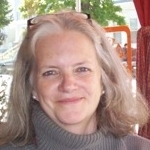( Host) The Brattleboro Women’s Film Festival runs March 8- 17. Writer Stephanie Greene, who lives on the family farm in Windham County, discovered that finding women’s films to screen can be a challenge.
Host) The Brattleboro Women’s Film Festival runs March 8- 17. Writer Stephanie Greene, who lives on the family farm in Windham County, discovered that finding women’s films to screen can be a challenge.
(Greene) The Brattleboro Women’s Film Festival opens next Friday with its gala and a screening of “The Girls in the Band.” The Festival has a mission to air women’s stories – in all their diversity.
Vickie Sterling is one of the organizers and the Co-Director of the Brattleboro Women’s Freedom Center. She says that films directed by women, about women are relatively rare. “Even though women make up at least half of the movie-going audience,” Sterling says, “only 5% of current films are directed by women at all, and an even smaller percentage of those center on women’s stories.”
Sterling reminded me that, in its 85 year history, a woman has won an Academy Award for best director just once: Kathryn Bigelow for “The Hurt Locker.” Sterling says, “We want to hear our own stories, and the trouble is that if you don’t hear it, you don’t always know what’s missing.”
Susan Cartsonis is Producer and Chair of Women in Film, a non-profit dedicated to furthering women’s achievements in entertainment, communications and media. She says, “[Women make up] a hugely powerful audience; it’s an audience that’s not represented enough. Only about 16% of the movies made in Hollywood are made specifically with the female audience in mind…”
The films under consideration were also subjected to the “Bechdel Test,” created by cartoonist and graphic novelist Alison Bechdel. To pass the test , a work must portray at least two women who talk to each other – for more than a few seconds, that is – about something other than men.
The film festival organizers had to go out and find the films that met these criteria. “We’re very thankful for the Internet,” Sterling laughs, citing the “Women Making Movies” website, among others. The organizers viewed more than a hundred films to settle on the 26 being screened at the festival. They also perused the offerings of other progressive film festivals world-wide, such as the Rocky Mountain Women’s Film Fest in Colorado and the Athena Film Festival at Barnard College in New York .
Of course, in providing a platform for women’s voices, one can’t help but notice that freedom looks quite different from one culture to another. This year’s offerings underscore that truism. For instance, in the Syrian documentary, “The Light in Her Eyes,” a woman starts a Koranic school for girls, which is an astonishing act of bravery. She explains that it’s important for women to understand the Koran so they won’t be oppressed by it. But she also attests that women will be judged by God as wives and mothers first. That could be a challenge for Western feminists to understand.
The festival benefits Brattleboro’s Women’s Freedom Center, which works to end violence against women, support survivors, and create a community in which violence is not tolerated.
Filling the story gap is an important step in that process.